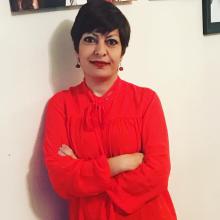Iran's Girls of Revolution Street
From Literary Narratives to Text Based Protests to Cyberactivism
Thursday, Oct. 11, 2018, 3:30 – 5 p.m.
Allen Library Auditorium
On January 29, 2018, social media sites published photographs of Iranian women from multiple cities protesting compulsory veiling. Hailed as Girls of the Revolution Street, their hashtag #girlsofrevolutionstreet references their predecessor, Vida Movahed, the first woman to stage a protest on Tehran’s Enghelab (Revolution) street in December 2017. While Girls of Revolution Street movement explicitly critiques compulsory hijab, Iranian women have also engaged in various forms of resistance throughout the past forty years, such as through writing novels, short stories, and poems. Examining literary narratives written between 1979-2018 that reflect socioeconomic elements essential to contextualizing questions surrounding the veil, this talk addresses women’s lived experiences with veiling and the ways that Iranian women’s national and cultural identity is associated with the veil as reflected in the literature written after the 1979 Islamic Revolution of Iran. In order to produce a nuanced analysis of these themes, Dr. Yaghoobi’s approach selects literary narratives as “literary counterpublics” in Hoda Elsadda’s words (2010), or discursive mechanisms of counter-discourses shaped alongside official narratives pertinent to a social and cultural issue, here the modest dress codes and mandatory public hijab.
Dr. Claudia Yaghoobi is a Roshan Institute Assistant Professor in Persian Studies at the Department of Asian Studies at the University of North Carolina, Chapel Hill. She is the author of Subjectivity in ‘Attar, Persian Sufism, and European Mysticism, by Purdue University Press in 2017. Some of her recent publications include an article titled, “Pirzad’s Diasporic Transnational Subjects in ‘A Day Before Easter’” in International Journal of Persian Literature and another one titled, “Mapping Out Socio-Cultural Decadence on the Female Body: Sadeq Chubak’s Gowhar in Sange-e Sabur” in Frontier: A Journal of Women’s Studies in 2018.
This event is FREE and open to the public.
